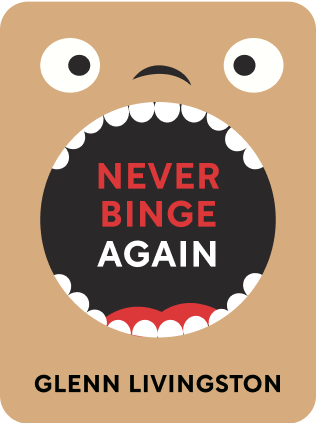

This article is an excerpt from the Shortform book guide to "Never Binge Again" by Glenn Livingston. Shortform has the world's best summaries and analyses of books you should be reading.
Like this article? Sign up for a free trial here .
Why do we binge eat? How can we take back control of our urges?
In his book Never Binge Again, Glenn Livingston discusses the root cause for why we binge eat. Livingston says that we all have an “inner pig” in our brains that crave mass quantities of food to ensure our survival. Unfortunately, we no longer need to store up food to survive and the inner pig isn’t easy to turn off.
Continue reading to learn more about why we binge and how we can work to silence our inner pigs.
Why Do We Binge Eat? The Inner Pig
Do you:
- Feel unable to control your eating despite knowing it’s terrible for your health?
- Feel powerless to resist anything that tastes good in mass quantities?
- Find it hard to stop thinking about food?
- Feel desperate to control your food problem?
So why do we binge eat? Because there is a part of you that exists only to feast. It doesn’t care about your well-being and about your life goals. It defeats you at every opportunity and wants you to fail so it can have food orgies.
Call this the “Pig.” The Pig is your fat-thinking self. It hijacks your survival drive toward food behaviors that do NOT serve your best interests. It’s an out-of-control eating machine that will destroy everything if you love it. It sabotages your plans and exists only to satiate itself. The Pig is responsible for a lot of misery in your life—eating the wrong foods, in the wrong portions, downgrading your health and quality of life.
(If the term “Pig” is offensive to you, or on the other hand too cute to be repulsive, pick any other term that works for you—“the inner food demon,” “the slob,” “the junkyard dog,” your “lizard brain.” It has to evoke the idea of an aggressive, manipulative bully instead of a cutesy animal to take care of.)
To build out the idea: the Pig that only wants to binge on Pig Slop, which is exactly what you want to stop eating. It eats from the Pig Trough. It emits Pig Squeals to get you to listen to it and let it do what it wants.
Have No Mercy for The Pig
Importantly, the Pig is NOT you! Separate the Pig out from the rest of you. You may want to love ALL parts of yourself, like self-help gurus tell you to. But certain impulses are too strong to restrain when they’re given even a tiny opening.
The Pig is a bully that deserves no patience or tolerance. It’s held you back for years, possibly decades, talking you out of every reasonable weight-loss plan, robbed you of the body and energy you want, made you feel hopeless after years of effort. It’s time you put it in its cage.
The Pig is worthy of permanent rejection. It’s repeatedly caused you to act against your best judgment. It deserves NO love and NO compassion. It will dominate you if you show it any mercy.
- Would you tolerate a friend who repeatedly sabotaged your plans, instilled doubt in your mind, laughed at your goals, and wished for your failure? Of course not.
Dealing with the Pig isn’t like nurturing a wounded animal back to health. It’s not your inner child, or a cute little pet. It’s more like caging an aggressive pit bull. The dog must respect and obey you. This is not a game of mercy—it’s a game of unbreakable control and domination.
It’s almost impossible to “love yourself thin”—certain impulses are too strong to restrain when they’re given even a tiny opening. You’ve tried to indulge yourself in the past, but it hasn’t worked to meet your weight goals—isn’t it worth trying something different?
Here’s how you can separate out the Pig from the rest of you:
- You have dreams and aspirations, but the Pig lives only to Binge.
- You want to live life to its fullest. The Pig doesn’t care about the consequences to your health or happiness—it just wants to get its Binge at any cost.
- You can accomplish amazing things and plan for the future. The Pig sees life as one giant food party and spends all its energy trying to get you to indulge.
(Note that the Pig doesn’t literally exist as a portion of your brain—it’s just a conceptual framework to separate your primal feelings that have derailed your most rational self. The closest analog to the Pig is a primitive part of your brain called the Brain Stem. But thinking of it as a real separate entity makes controlling it easier.)
How the Pig Developed
The Pig arose as a survival tool, to make sure you ate enough to survive. This was important when prehistoric humans went through periods of intermittent famine. This behavior is common to pretty much all animals—call this your Lizard Brain, which cares only about eating, reproduction, and survival.
But in today’s environment, when survival is much easier and food is aplenty, the Lizard Brain is counterproductive. Food developers hijack this survival drive with addictive foods that give you Food Highs that deceive you about their nutritional value. The Lizard Brain makes you overeat well beyond what’s necessary to survive.
Unlike quitting other bad habits, quitting bad food habits is hard because you have to keep eating something. You can’t just quit food cold turkey. This is why quitting food might be harder than quitting cigarettes or drugs.
Plus, some of us are more susceptible to overeating than others. Some people were born never having a problem with overeating. Others have a biochemical setup that makes it extremely difficult to resist (in prehistoric times, you might have better-endured famine—nowadays, you just get fat).
- Don’t compare your difficulty to other people’s. Just because other people seem to have no difficulty with it doesn’t mean you’re weak—you don’t blame yourself for not being 7 feet tall and being able to dunk a basketball.
- But also don’t take your predisposition as an excuse to be weak, or as a sign of certain failure. You have 100% control over your behavior. Believing otherwise will doom you to failure.
Over time, the Pig was strengthened by outside influences:
- Super-rewarding processed foods, giving you a Food High
- Processed foods originated when food was scarce, and preserving food was difficult. Food needed to be processed to increase calorie density for transport.
- Nowadays, sugar, salt, umami, and texture are engineered to hijack what your brain has evolved to think is good nutritious food (Doritos are a perfect example).
- The reward circuit of the brain amplifies its response, giving you highs that normal unprocessed foods don’t.
- Like with drugs, you will keep trying to chase that high. Normal foods are no longer good enough. Compared to candy bars, fruit no longer tastes sweet. Your salt sensors have been blown way out of line.
- Marketing for these delicious food highs
- Food companies happily deceive you by pointing out one benefit while disguising the others. Nuts that are “high in omega-3” may be high in sodium; “low fat” yogurt may have added sugar.
- Advertising will have you believe that your Binge foods are critical to life and survival. They’re not! You will realize over time that whole, unprocessed foods are delicious and nutritious.
- Strong social and familial support for indulgence
- In the past, food was scarce for humans, and wasting food was an atrocity. Conversely, eating sugary and fatty foods was a sign of wealth. These behaviors have largely persisted to today.
- Traditions, Holidays, and events that reinforce use of these foods
- Think of overeating at Thanksgiving and Christmas.
- Unspoken cultural prohibitions against abstaining
- Especially if you’re around people with food problems, they’ll look askance at you for trying to “be better than they are.” This is just their own guilt projected onto you and trying to hold you back.
- Messages that you’re powerless over your addictions.
- Some addiction messaging has convinced people they have a disease that they are powerless to stop (Alcoholics Anonymous uses this). The benefit here is reducing shame about their indulgences, realizing that they need help outside themselves. It makes it easier for families to accept their loved one was suffering from a disease rather than being selfish and weak.
- But this also removes individual responsibility. It turns the person into a permanent victim.
Internally, the Pig is strengthened by your psychology. When you doubt whether you can successfully cage the Pig, you give the Pig strength. If you have low self-esteem, the Pig can overpower you.

———End of Preview———
Like what you just read? Read the rest of the world's best book summary and analysis of Glenn Livingston's "Never Binge Again" at Shortform .
Here's what you'll find in our full Never Binge Again summary :
- How to lose weight, stop using social media, exercise more, and work harder
- How to create a food plan and follow it 100%
- Why you shouldn't be ashamed of yourself if you make a mistake






